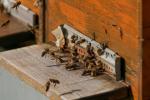H2020 SKIN Project: Short Supply Chain Knowledge and Innovation Network
- Type Project
- Status Filled
- Execution 2016 -2019
- Assigned Budget 1.999.718,75 €
- Scope Europeo
- Main source of financing Horizon 2020
- Project website Proyecto SKIN
"The specific elements coming from the collected GPs were relevant not only for SFSCs, but also for SMEs and policymakers. A good example is the proposal for a regional law in Apulia (Italy) aimed at supporting and valorizing local agri-food businesses as zero-km products, taking into account some input from SKIN's experience and knowledge. The general trends and bottlenecks identified on the basis of the collection of good practices were used during foresight activities, resulting in concrete and provocative inputs to different community-building events. These community-building events made the collected GPs accessible and exploitable by those who would benefit most from them. The main aspects derived from the foresight exercise led to the production of 4 different presentations (available on the SKIN website), and focused on specific aspects in order to provide those involved in regional, urban or rural development policy with some ideas on how they can enhance the creativity of their city by developing creative and new clusters. entrepreneurial ventures based on new and emerging models of local food systems and linking them to the circular bioeconomy.
Community building and animation expanded the internal contact list and registered database by involving more stakeholders, especially during the second period with the organization of the ICWs. The adoption of a bottom-up approach and the creation of NRs were successful; in fact, the involvement of local stakeholders made it possible to identify the specific needs of local markets. It proved useful to bring together different end-users and enable them to mutually enrich and exchange their approaches, thus promoting knowledge-based agriculture and innovation-driven research. This facilitated knowledge exchange between scientists and practitioners on agri-food practices during the planned coaching sessions, where existing knowledge was contributed and shared.
The expected impacts related to communication and outreach activities are described below: Multimedia and storytelling formats:
- Video formats: 6 videos produced (Short institutional video project, Long institutional video project and web videos).
- Video interviews: 36 interviews conducted at the various Innovation Challenge Workshops.
- Storytelling: 1 flowchart summarizing SKIN and 6 short videos related to ICW topics and grouped into a glossary; Press releases and notes: 6 News articles and interviews: 6 E-newsletters: 1 every 6 months.
- Social networks:
- LinkedIn: 55 members.
- Twitter: 770 followers.
- Facebook: >100 members.
- In addition, nine scientific articles have been published, and more are in progress. In particular, four articles based on SKIN's main products are included in a special issue of the international journal "Studies in Agricultural Economics" dedicated to SFSC. Thanks to all the networking and dissemination activities at different levels, SKIN has gained significant visibility by raising awareness about the various aspects related to SFSC and the importance of food quality throughout the entire chain.
The first step in building the community was the identification of SFSC good practices (GPs). An interactive and intuitively navigable manual was developed for their identification, collection, and recording. The "GP Registration Template" generated relevant information for end-users and EIP-AGRI practice summaries.
These tools were used throughout the project's lifespan for the GP collection. SKIN partners were actively conducting the GP collection, divided into two phases. During phase 1, partners collected GPs in their regions/countries, while in phase 2, additional GPs outside the SKIN area were identified to expand the GP repository and cover different cases. More than 160 good practices have been collected (http://www.shortfoodchain.eu/good-practices/). Based on these, general trends and bottlenecks were identified, and forecasting scenarios for the development of SFSC in Europe were developed. SKIN partners developed a strategy on "How to build the stakeholder database," and an internal stakeholder contact list with approximately 3,000 stakeholders was created, while the SKIN community has grown to more than 200 registered individuals.
Guidelines for learning and brokerage activities and stakeholder engagement were provided and used as primary tools during the networking events. The partners are inviting stakeholders to join the virtual community of practice to keep the SKIN network alive after the project ends. The organization of six Innovation Challenge Workshops (ICWs) represented an important opportunity to strengthen the network, meet with stakeholders, share GPs, and capture new ideas. These ICWs focused on different topics, particularly fresh produce, new skills in agriculture, AKIS, consumers, technologies, logistics, and regulations. Approximately 50 people participated in each ICW, and experts, including GPs, were invited to discuss specific topics and share their experiences.
Typically, ICWs were organized to combine field visits directly to GPs' facilities and a networking session to enhance interaction between participants. During these events, experts and GP representatives were interviewed, and 36 short videos were posted on the project website. In addition, various dissemination materials were prepared and distributed through dissemination channels following each ICW. Thirty-nine Regional Nodes (RNs) were identified across SKIN countries, and a dedicated section on the project website was devoted to disseminating news related to RN events. In addition, several initiatives and activities, including coaching and in-house coaching for trainers, were implemented to support multidisciplinary groups and promote new innovative projects.
SKIN was a challenging initiative of 22 partners in 15 countries in the area of Short Food Supply Chains (SFSC). By addressing the main problem of the research gap and a better deployment of existing scientific knowledge, SKIN led to the creation of a thematic network on SFSC. The project originated from an analysis of the role of SFSC in achieving the dual objective of sustainable agricultural production in economic, environmental and social terms (including multifunctionality) and improving the competitiveness of European farmers. Although the competitiveness and sustainability of the agri-food sector can be improved through innovation at the level of farms or individual producers, additional benefits can be achieved through innovation at the level of the supply chain itself. This requires cooperation between the different actors involved, as well as leadership to drive the overall innovation agenda.
SKIN's main challenge has been to bring the community together and create a network to improve the efficiency of SFSCs, benefiting stakeholders and fostering growth in the sector. SKIN's overall objective was to address this fragmentation in access to different practice models, systematize available information and data, empower potential innovators in agri-food chains, and create an EU community that would serve as a permanent platform for knowledge exchange, transnational cooperation, promoting innovation, and generating input for policymakers. To this end, a virtual "Keep-it-Short" community of practice has been created and is now being implemented.
SKIN is an ambitious initiative of 20 partners in 14 countries in the field of Short Food Supply Chains (SFSC). Its objective is to systematize and bring knowledge to professionals, promote collaboration within a demand-driven innovation framework, and provide input to policymaking through links with the EIP-AGRI. SKIN will build and animate a community of approximately 500 stakeholders, with the strategic objective of creating, upon project completion, a European partnership permanently working to improve the efficiency of SFSCs, benefiting stakeholders and the growth of the sector.
The community will be built and animated around the identification of good practices in short supply chains across Europe. Partners will explore, analyze, and classify a significant number of cases in different countries. The best practices (at least 100) will be systematized, processed into highly usable formats (including videos and page flows), and made available to stakeholders via the web (following EIP AGRI formats) and through the creation of regional hubs, to enable deeper penetration of existing knowledge into practice. The work on good practices will also allow for the identification of key issues (obstacles or opportunities) surrounding SFSCs. These issues will be the main topics of six “Innovation Challenges Workshops,” the purpose of which is to stimulate stakeholders to propose new ideas for innovation-based research or innovation adoption.
These will be supported by a coaching phase, where consortium partners will provide guidance to stakeholders for the full development of these innovative ideas. SKIN invests significant effort in dissemination, to reach as many stakeholders as possible, and in exploitation, to plan post-project development in the form of a permanent partnership that would provide continuity to the activities launched with the project (community expansion, sharing of best practices, promoting research-based innovation, and linking with the EIP and policymaking bodies).
- UNIVERSITA DEGLI STUDI DI FOGGIA (UNIFG)







